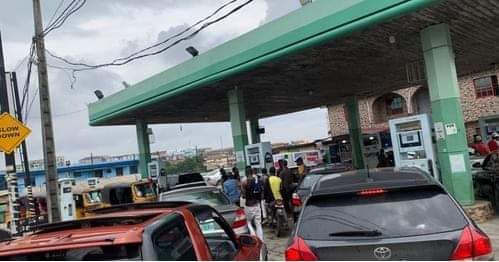As fuel consumption in Nigeria continues to fall, around 10,000 oil dealers face business closures, citing low demand and market challenges.
With fuel prices soaring, oil marketers are raising concerns about substantial financial losses, warning that approximately 10,000 dealers are at risk of shutting down their operations.
According to the Nigerian Midstream and Downstream Petroleum Regulatory Authority, Nigeria’s daily fuel consumption experienced a significant decline, dropping from 60 million liters in May 2023 to just 4.5 million liters by August 2024—a decrease of 92%.
The report also indicates that in August, just 16 out of the 36 states received fuel supplies from the Nigerian National Petroleum Company Limited (NNPCL), worsening shortages.
The steep drop in consumption is a consequence of President Bola Tinubu’s removal of fuel subsidies in May 2023. This action led to petrol prices skyrocketing by 488%, increasing from N175 per litre to over N1,000 by October 2024.
The increase in fuel prices has unsettled the economy, leading to higher transportation costs and pushing up the prices of goods and services. Consequently, many Nigerians are opting for public transport instead of using their personal vehicles.
The national leadership of the Petroleum Products Retail Outlets Owners Association of Nigeria (PETROAN) has announced that a significant decline in fuel consumption is pushing many members toward closure, placing approximately 10,000 dealers at risk of going out of business.
Dr. Joseph Obele, the National Public Relations Officer for PETROAN, remarked on the situation by revealing that the price of a truckload of petrol has surged from N7 million to N47 million in just 16 months.
“Obele explained that a meeting took place at PETROAN’s national headquarters three days ago. During the meeting, it was suggested that roughly 10,000 of our members might exit their businesses within the next 45 days due to significant impacts on their trading capital.”
He also mentioned that the affected dealers provide employment for approximately one million workers throughout the sector.
He added, “That’s why we sent a letter to the President on October 21, requesting a N100 billion grant to prevent these businesses from shutting down in the coming weeks.”
Abubakar Maigandi, who serves as the President of the Independent Petroleum Marketers Association of Nigeria (IPMAN), confirmed that there has been a drop in consumption and stated that it had a significant impact on their operations.
“There has been a decrease in consumption, and the cost of a truckload has risen. Consequently, we’ve had to reduce our purchases. For instance, where a dealer previously purchased 10 trucks, they can now only afford eight,” Maigandi explained.
The Nigeria Union of Petroleum and Natural Gas Workers (NUPENG) has expressed worries about job losses due to marketers struggling to afford fuel supplies. Those most impacted include truck drivers and petrol station employees.
“The economy is facing significant challenges. Many petrol station owners find it difficult to afford even one truckload, impacting our members,” stated NUPENG’s Secretary-General, Mr. Afolabi Olawale.
He stated, “The situation is still developing, so I can’t provide precise numbers of those affected as it includes both formal and informal sectors. However, workers in the downstream sector are suffering the most significant impact, such as truck drivers, station employees, and depot representatives.”
Obele also pointed out that the increase in fuel prices had reduced cross-border fuel smuggling, which had been widespread before.
Peoplesmind


